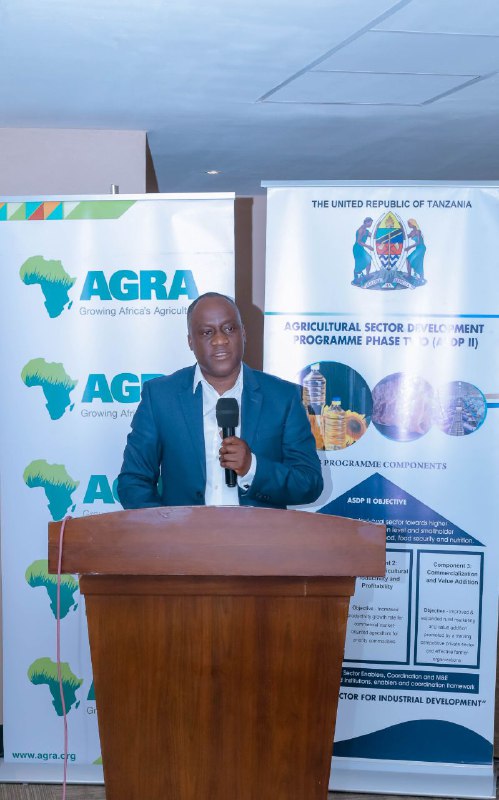
A warm and hearty hello from Tanzania, often fondly referred to as the vibrant heart of Africa! With immense pleasure and pride, I invite global citizens, organizations, and thought leaders to convene at the monumental Africa’s Food Systems Summit 2023 (AGRF 2023 Summit). Scheduled to unfold between the 5th and 8th of September 2023, this transformative event will be hosted in the pulsating, culturally rich city of Dar es Salaam.
Endorsed and hosted by H.E Dr. Samia Suluhu Hassan, the President of the United Republic of Tanzania, and the AGRF Partner’s Group, this Summit will serve as fertile ground for insightful dialogues, active collaboration and decisive actions, all geared towards shaping the trajectory of Africa food systems’ transformation in the coming days.
The central theme of our 2023 Summit, “Recover, Regenerate, Act: Africa’s Solutions to Food Systems Transformation,” aptly articulates our unwavering commitment to building and strengthening our food systems. We intend to spotlight the critical roles of our youth and women, considering them pivotal drivers and players of sustainable wealth creation across the continent. Smallholder farmers form the very core of Tanzania’s agriculture and food systems.
Their tireless efforts and unyielding commitment serve as the vital spark driving this ongoing transformation. As we echo the resonant call, “Kilimo ni Biashara” – Agriculture is Business, we recognize and underscore the pivotal role of these farmers. Not merely cultivators of the land, they are entrepreneurial stewards of our resources, business owners in their own right, operating at the front lines of a shifting agricultural landscape. They stand as testament to the power of agriculture as a viable and important business, capable of steering our nation towards a future of sustainable prosperity.
In Tanzania, the government, private sector, and civil society’s commitment go beyond preservation of our food systems; we aspire to lay the foundation for an equitable, prosperous, and sustainable future. This aspiration aligns seamlessly with our country’s vast potential as a thriving hub for agricultural investment and source of food at regional and continental level. Our nation boasts diverse value chains that span a vast geographical expanse, thus making Tanzania a veritable treasure trove of untapped opportunities for domestic and international investors.
With a firm commitment to becoming a key food provider in Africa and beyond, Tanzania is steadily strengthening its capacity. Strategic efforts led by the Agricultural sector ministries are paving the way for this transformation, as they set their sights on establishing a strategic production of more than 12M Metric Tonnes of grains. . Tanzania’s grain reserves have proved a safety net during times of scarcity and as a stabilizer for market prices, reinforcing food security on a national and regional level.
Our agribusiness sector is teeming with a broad spectrum of possibilities, from farming to processing, packaging, and exporting. Tanzania’s abundant geographical diversity, ranging from the fertile expanses of Kilimanjaro to the boundless plains of the Serengeti and the picturesque coastal regions along the Indian Ocean, presents a plethora of opportunities for agricultural investments.
Our geographical diversity (seven agro-ecological zones), vast cultivable land, and favourable climate serve as strategic assets that position us not only to fulfil our dietary needs but also cater to the needs of our neighbouring nations. This progress aligns with our steadfast commitment to strengthen food security, stimulate economic growth, and carve a path towards a prosperous future that ensures equity and sustainability.
Tanzania is a virtual cornucopia of agricultural investment opportunities. Our diverse value chains spread across varied geographical terrains, form a sturdy and resilient platform for investors. Whether it’s the fertile soil of Kilimanjaro, the coastal areas along the Indian Ocean, or the multifaceted agricultural diversity in between, we offer various agricultural activities and untapped potential for sustainable investments.
Whether your interests lie in horticulture, grains, roots/tubers, livestock, or fisheries, Tanzania is fertile ground for all. The government of Tanzania is particularly keen on fostering investments that prioritize sustainability, resilience, and inclusivity, contributing to the collective welfare of our people and our planet.
Tanzania’s diverse agricultural landscape is uniquely enriched with the potential to cater to an extensive variety of crops and livestock, promising a surge in industrial growth that could mark the advent of a transformative era for Africa’s economy. Our fertile lands, favourable climate, and rich biodiversity underscore our potential to become the epicentre of Africa’s green revolution.
Our agricultural potential is rooted in an already thriving cultivation of various key staples. Our lands yield rich harvests of rice, maize, cassava, beans, and a multitude of other food crops, to mention a few. Each of these crops is embedded within an extensive value chain, offering myriad opportunities for employment and industrialization from the initial steps of cultivation to the final stages of processing and distribution.
In the realm of rice production, for instance, Tanzania has a profound capacity to provide for a substantial part of Africa. Areas like the Ruvu Basin, Kilombero, Kyela, and Rufiji have the potential to produce rice in vast quantities, each capable of feeding different regions of Africa. Their production, in turn, could feed into mills and processing plants, creating an entire industry around rice alone.
Our maize, another major staple, with annual production of more than 7M Metric Tonnes, is an asset for the whole continent. Cultivating maize provides food security and potential raw material for milling, brewing, and animal feed production industries. Similarly, cassava, a resilient crop that thrives in diverse conditions, can be transformed into multiple products from flour to biofuel, presenting another avenue for industrial growth.
Beans and other legumes, with their nitrogen-fixing properties, enhance our soil fertility while also serving as a source of protein for our population and livestock. Their cultivation supports the food chain and agricultural industries alike, from canning to producing plant-based protein alternatives.
Aside from crops, Tanzania’s livestock potential is another promising area. Our cattle, goats, sheep, and poultry can significantly contribute to food security and provide inputs for the dairy and meat processing industry. Further down the line, these sectors link with others, creating logistics, retail, and hospitality industry opportunities.
Let me also highlight the enormous potential within Tanzania’s blue economy. The blue economy encapsulates the sustainable use of ocean resources for economic growth, improved livelihoods, and jobs while preserving the health of our ocean ecosystems. With a coastline stretching over 1,400 kilometers along the Indian Ocean, Tanzania is uniquely positioned to leverage this resource.
Tanzania’s marine and freshwater resources, including lakes, rivers, and expansive coastal areas, offer vast opportunities for sustainable development. This blue economy could contribute significantly to food security, livelihoods, and economic growth through fisheries, aquaculture, tourism, transport, and maritime logistics industries.
Integrating the blue economy concept into our overall agro-industrialization strategy is key to unlocking this potential. By promoting sustainable fishing practices, encouraging the growth of aquaculture, and investing in the processing and value addition of marine products, we can further diversify our agricultural sector and boost our economic resilience.
The wealth of our agricultural produce not only ensures food security for Tanzania but the region. Tanzania’s agricultural wealth provides an enormous opportunity for industrial take-off. By harnessing the power of our lands, we can spur economic growth, enhance food security, and lead the way towards a sustainable and prosperous future for all of Africa.
The rapid progress in Tanzania’s agricultural sector can be likened to a meticulously conducted symphony, with various transformative initiatives each playing their unique yet harmonious parts. As we observe the sector’s transformation, we see a clear, orchestrated plan taking us closer to becoming Africa’s agricultural powerhouse, potentially mirroring China’s industrial success story.
The Agricultural Sector Development Program Phase II (ASDP II) is instrumental to this orchestrated approach, operational from 2017/2018 to 2027/2028. ASDP II serves as a roadmap towards amplified productivity, enhanced market access, and bolstered resilience and sustainability within the agricultural sector. This strategic program is effectively steering our nation’s journey towards agricultural prosperity.
Cementing the path towards this agricultural renaissance is the Agricultural Sector Transformation Agenda, aptly dubbed Agenda 10/30. This comprehensive framework elaborates the concept of block farming, and expounds on the vision of an intensified agro-processing landscape, the expansion of robust irrigation systems, and the capacity enhancement of agricultural institutions and regulatory mechanisms.
Furthermore, the Tanzania Agro-industries Development Flagship (TAIDF) epitomises our strides towards agro-industrialisation. The initiative, meticulously crafted by the Secretariat of the ASDP II stands as a cornerstone of our journey. The TAIDF, born out of extensive consultation with diverse stakeholders, exemplifies a holistic and inclusive approach to agro-industrialization.
Adding to this robust tapestry of initiatives is the Building a Better Tomorrow-Youth Initiative for Agribusiness (BBT-YIA), a model of successful multi-stakeholder collaboration. The brainchild of a concerted effort by the Government of Tanzania, the private sector, and development partners, the BBT-YIA is empowering the youth with entrepreneurial opportunities in agribusiness. This initiative not only strengthens the agricultural sector but also create employment opportunities for the youth thus securing a promising, sustainable future for our youth, and by extension, for Tanzania.
All these initiatives are leading to the multiplication of local industries for agricultural inputs and, simultaneously, they promote value addition to our products, bolstering their appeal in both domestic and export markets. Through this synergistic approach, we see an agricultural landscape that presents immense opportunities in agro-processing, potentially elevating Tanzania to the China of Africa in terms of industrialization. The commitment shown by the Tanzanian Government, and the unwavering support from development partners, are essential fuel to this transformative fire.
While we aspire to become the China of Africa in terms of industrialization, we also envisage a thriving blue economy that mirrors the success stories of nations like Norway and the Seychelles. By harnessing the potential of our blue economy, we add a new dimension to our agro-industrial ambitions, strengthening our journey towards sustainable and inclusive growth.
AGRA stands resolutely side-by-side with Tanzania in this pivotal journey. By lending our expertise and resources, we continue to support the realization of a vibrant, profitable, and sustainable agricultural sector. Together, we are shaping a narrative of growth and prosperity that resonates not only within Tanzania but also sets an example for the whole of Africa.
Once again, welcome to the Summit to be held at the famous Julius Nyerere International Convention Centre in Dar es Salaam. In the days leading up to the Summit, we invite you to partake in field visits from 2nd to3rd of September 2023 and a pre-summit on the 4th. These experiences will offer invaluable first-hand exposure to Tanzania’s agricultural sector’s diversity, dynamism, and potential.
With warmth and anticipation, I invite you to join us in Tanzania this September. Come to participate in reimagining and reshaping Africa’s food systems and discover our beautiful country’s myriad agribusiness opportunities. Let’s drive change, spark action, and secure a radiant, sustainable future together.
Karibu Tanzania – Welcome to Tanzania!
Vianey Rweyendela,
AGRA Tanzania Country Manager

